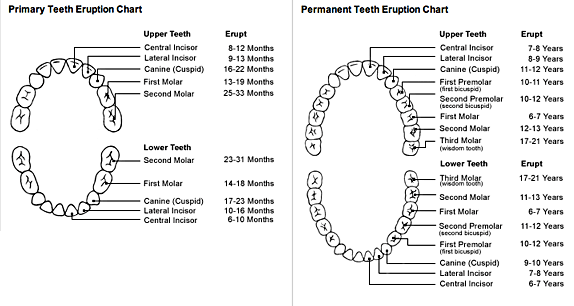Teeth are one of the earliest dental concerns for most parents. There is a normal timeline on which parents can expect baby teeth to emerge and then fall out. There are also some best practices that parents can follow when caring for their children’s baby teeth, while they are emerging as well as falling out. Below is the average timeline, as well as what you can expect while your child’s baby teeth begin coming loose.
When Do Baby Teeth Come In and When Do They Fall Out?
Every child will have a slightly different time frame for when they are developing and losing their baby teeth. Most children start developing teeth between six and 12 months, and typically have all of their baby teeth by the age of three. Baby teeth can start to fall out around between the ages of five and seven.
Order of Losing Teeth
The common rule for losing baby teeth is that teeth will fall out in the order in which they came in. When your child is losing their teeth, you may notice increased space in their smile around their other baby teeth. This is normal, as the jaw and mouth change to accommodate bigger adult teeth. Below is a typical pattern of adult tooth eruption loss, which correlates directly with baby tooth loss.

Upper Teeth
- First Molar — erupts between ages six and seven.
- Central Incisor — erupts between ages seven and eight.
- Lateral Incisor — erupts between ages eight and nine.
- First Premolar — erupts between ages 10 and 11.
- Second Premolar — erupts between ages 10 to 12.
- Canine — erupts between ages 11 to 12.
- Second Molar — erupts between ages 12 to 13.
- Third Molar (Wisdom Tooth) — erupts between ages 17 to 21, if at all.
Lower Teeth
- Central Incisor — erupts between ages six to seven.
- First Molar — erupts between ages six to seven.
- Lateral Incisor — erupts between ages seven to eight.
- Canine — erupts between ages nine and 10.
- First Premolar — erupts between ages 10 to 12.
- Second Premolar — erupts between ages 10 to 11.
- Second Molar — erupts between ages 11 to 13.
- Third Molar (Wisdom Tooth) — erupts between ages 17 to 21, if at all.
Wisdom Teeth
Wisdom teeth, or third molars, develop differently than other permanent teeth in the mouth. Wisdom teeth have no correlating baby teeth. This can cause spacing issues in the mouth as the wisdom teeth develop, as they aren’t filling in an empty space. Wisdom teeth can also grow impacted, or sideways, growing toward the other teeth. This can cause pain as well as dental crowding. Because wisdom teeth develop when typically most, if not all the baby teeth have already been lost, impacted wisdom teeth can pose a serious threat to the adult teeth, and in many cases require oral surgery to remove. Some teens and adults don’t develop wisdom teeth, or don’t develop a full set of wisdom teeth. Your dentist or orthodontist will be able to track the development of your child’s wisdom teeth at your regular appointments and will prescribe the appropriate course of action.
Should I Pull a Loose Tooth?
It is best to let teeth fall out naturally, as pulling them can cause trauma to the gums around the tooth. If your child has a loose tooth, talk with them about how activities like eating, physical exercise, and even talking can further loosen, or cause a wiggly tooth to fall out. In the event that your child swallows a tooth, stay calm. Swallowing a baby tooth is not typically harmful, as they can generally pass through the digestive system without trouble. However, if your child experiences any pain in the chest or abdomen, or there is blood in their stool after swallowing a tooth, you should consult your doctor as soon as symptoms appear.
What if Baby Teeth Don’t Fall Out?
In the case of baby teeth retention, an orthodontist can help evaluate the situation and determine if any persistent dental problems exist. Orthodontists specialize in dental irregularities of all types, so they may be more suited to treat these concerns than your standard dentist. Conditions like hypodontia, or the absence of one to five adult teeth, can result in your child retaining their baby teeth into adulthood. However, the absence of permanent teeth is not always a dire problem, and you can talk to your orthodontist about the best option for your child’s oral health, as well as any financing options that may be available to you.
Potential Issues With Baby Teeth
While baby teeth are impermanent, it’s still important to practice good oral hygiene with your kids. The health of baby teeth can impact the health of adult teeth, and improper hygiene can cause some of the following issues:
- Tooth decay: Tooth decay can cause baby teeth to fall out too early, as well as be exceedingly painful. You can prevent tooth decay by using fluoride toothpaste and mouthrinse as soon as teeth start to develop — your dentist can tell you the healthy amount of fluoride toothpaste/rinse for your child’s age range.
- Gingivitis: An infection of the gums caused by poor oral hygiene, gingivitis can cause baby teeth to fall out prematurely, gums to bleed frequently, and can ever result in ulcers on the gums. Flossing and brushing regularly can help combat gingivitis.
Spacing Issues: If baby teeth fall out too early, it can cause spacing issues as adult teeth start to develop, including oral crowding as well as gaps in the bite. Problems in spacing can increase plaque build-up, affect chewing ability, and even cause speech impediments. Spacing issues caused by premature tooth loss may require braces or aligners like Invisalign, to be corrected, which can be costly and uncomfortable.
